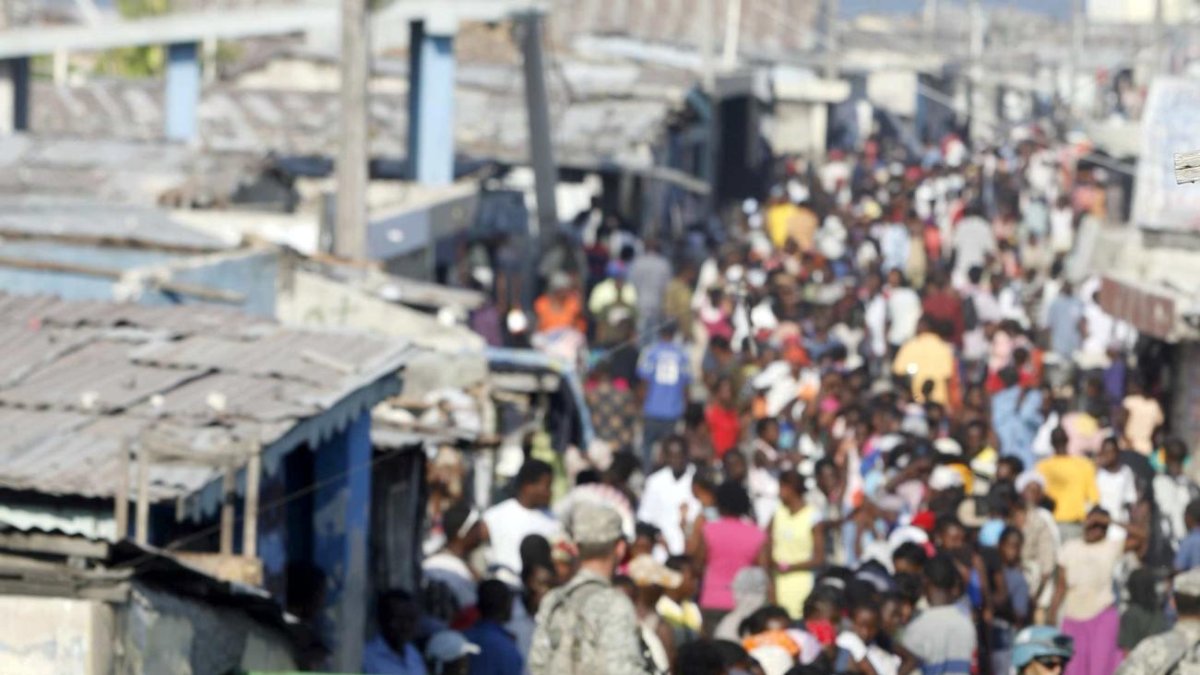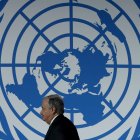Sexual abuse in humanitarian organizations: A global scandal that shakes the UN, the Red Cross, NGOs and even the ICC
These cases have exposed a disturbing pattern of impunity and cover-up within some of the entities that, ironically, have the mission to protect vulnerable populations.

UN blue helmets in Haiti in 2010.
In recent years, hundreds of allegations have come to light of sexual abuse committed by members of humanitarian organizations and peacekeeping organizations, including the UN, the Red Cross and various NGOs. These cases have exposed a troubling pattern of impunity and cover-ups within some of the entities that, ironically, are tasked with protecting vulnerable populations.
UN Blue Helmets: repeated allegations
One of the biggest abuse scandals involves UN peacekeepers. In Haiti, a study revealed that between 2004 and 2017, approximately 2,000 women and girls were sexually abused by the Blue Helmets.
According to testimonies, in many cases the victims became pregnant and were abandoned without any support.
Similar situations have been reported in the Democratic Republic of Congo (DRC). One of the first major scandals came to light between 2004 and 2006, when more than 140 cases of sexual exploitation and abuse by MONUC (United Nations Organization Mission in the Democratic Republic of the Congo) personnel were reported. The victims were mostly women and girls. There was talk of rapes, forced prostitution and even exchange of food or money for sex.
In 2015, a UN report recorded 69 cases of sexual abuse committed by the blue helmets around the world, and the DRC was one of the epicenters, along with the Central African Republic. Of those, 16 occurred specifically in the DRC.
Another major case occurred in 2023, when nine South African Blue Helmets were repatriated after being accused of sexual assault in eastern DRC.
A recent UN report states that in 2024, 125 victims of sexual misconduct were identified in various countries, 65 of whom were women who reported being raped and subsequently giving birth, for which they demanded child support, Associated Press indicated.
In this regard, since 2006, approximately 750 paternity and child support claims have been reported involving personnel in UN peacekeeping missions. However, more than 500 of these cases remain unresolved.
The largest number of cases in 2024 were reported in the Democratic Republic of the Congo (44) and the Central African Republic (40).
Allegations of sexual misconduct, including rape and sexual exploitation, also reached other missions, such as those deployed in South Sudan, Lebanon and UN political operations in Haiti, Colombia and Afghanistan, noted Associated Press.
Oxfam and Plan International: scandals in NGOs
NGOs have not been exempt from accusations either. In 2018, Oxfam, an organization dedicated to fighting global poverty, was embroiled in a scandal when it was revealed that workers in its Haiti delegation hired prostitutes, some allegedly underage, following the 2010 earthquake that killed more than 200,000 people. Subsequently, the Spanish affiliate Oxfam Intermón admitted to registering four cases of "sexual misconduct" from 2012 to 2018 in Africa and Latin America. Two are related to sexual comments by two workers towards other female employees; one is linked to harassment and intimidation by another worker towards a female colleague; while the remaining one was reported for the payment of sexual services to an adult person. The employee was dismissed.
For its part, Plan International confirmed that between July 2016 and June 2017, at least six cases of child sexual abuse committed by its employees and collaborators were recorded.
Of these cases, one involved a staff member, while the other five were perpetrated by external associates. The employee was terminated without references, and the associates' contracts were terminated immediately. In addition, five of the six cases were considered criminal in nature in their respective local contexts and were reported to the appropriate authorities.
In all cases, Plan International facilitated access for the victims and their families to local support networks, including medical and psychosocial assistance.
WHO and abuses in the fight against Ebola
Another alarming case was that of the World Health Organization (WHO), where 83 cases of sexual exploitation and abuse were reported in the DRC between 2018 and 2020, as part of a mission to combat Ebola in the Democratic Republic of Congo. Among those implicated were 21 WHO employees, generating a wave of international outrage.
The victims reported being encouraged to drink alcohol and forced to have sex in hospitals and other places. Some women became pregnant as a result of these assaults.
In response to these findings, WHO Director-General Tedros Adhanom Ghebreyesus apologized to the victims and promised strong action against those responsible.
WHO terminated the contracts of four people still on the payroll and pledged to implement reforms to prevent future abuses.
This scandal highlighted structural failures and individual negligence within WHO, highlighting the need to strengthen protection policies and whistleblowing mechanisms in humanitarian missions.
Red Cross: acknowledges cases of sexual misconduct but does not provide details
The Red Cross has also been singled out in various investigations. In 2018, the organization admitted that some of its workers had committed sexual abuse.
In February 2018, the International Committee of the Red Cross (ICRC) publicly acknowledged that, since 2005, 21 of its employees were fired or resigned following internal investigations for paying for sexual services. In addition, two others did not have their contracts renewed due to suspicions of sexual misconduct. This was announced by Yves Daccord, the then director general, in an official statement on February 24, 2018.
The ICRC has a strict policy that prohibits paying for sex, even in places where it is legal, because they see it as a violation of their humanitarian principles.
International Criminal Court chief prosecutor accused of sexual abuse
Despite the fact that this is not a humanitarian organization, it is necessary to add the allegation of sexual abuse against Karim Khan, chief prosecutor of the International Criminal Court (ICC).
It arose in May 2024 and has generated significant controversy. According to available details, a female ICC lawyer, whose identity is being kept anonymous for confidentiality reasons, reportedly confided to two close colleagues that Khan subjected her to sexual misconduct and abuse of authority during a period spanning April 2023 to April 2024. The allegations include attempts to coerce her into a sexual relationship, non-consensual touching and behavior such as locking her in his office or insisting that they rest together in a bed during an official trip.
In October 2024, Khan strongly denied the allegations, suggesting they could be part of a smear campaign related to his work, like the arrest warrants sought against leaders such as Israeli Prime Minister Benjamin Netanyahu and Russian President Vladimir Putin.
Colleagues of the alleged victim reported these facts to the Independent Oversight Mechanism (IOM) of the ICC in early May 2024. However, when the IOM contacted the woman to investigate, she decided not to file a formal complaint, citing distrust of the internal process and fear of retaliation.
This led the IOM to close the initial investigation in just five days, without questioning Khan, although it recommended that he minimize contact with the lawyer to avoid additional problems.
On November 11, 2024, the Assembly of States Parties of the ICC announced an external investigation, setting aside the IOM for possible conflicts of interest, given that the mechanism's new director would have close ties to Khan.
The case remains open, with the external investigation ongoing to determine the veracity of the allegations.
Impunity and lack of justice
Despite the evidence, many of these allegations have gone unpunished due to the lack of adequate mechanisms to prosecute those responsible. In the case of the UN, for example, the Blue Helmets usually enjoy diplomatic immunity, which makes it difficult for them to be prosecuted in the countries where they committed the crimes.
Victims, for their part, face enormous obstacles in obtaining justice. Many of them come from vulnerable communities where reporting can mean reprisals or social stigma.
Conclusion
The sexual abuse scandals in organizations such as the UN, the Red Cross, WHO, various NGOs and even the ICC reveal a deep crisis that goes beyond isolated cases: a system that, in many cases, prioritizes its image over justice and the protection of victims. Despite promises of reforms and announced investigations, slow accountability and persistent impunity - reinforced by diplomatic immunities and structural failures - continue to leave vulnerable populations in a state of helplessness. Until March 2025, concrete progress is conspicuous by its absence, raising an inescapable question: if the institutions charged with defending human rights cannot protect their own victims, how can they remain a beacon of hope for the world? The answer, for now, remains pending, as global confidence in these organizations erodes with each unresolved allegation.




























